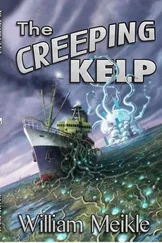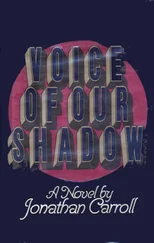“Forty-two degrees here, and falling.” I was sitting in a Queen Anne armchair to the left of the wide front door. A standard lamp with one of those mangy tasseled shades cast uncertain light on the flagstones. “It’s got to be a focus. Woo! See that?” The light had flickered off, then on again. “Got electrical interference, too.”
“Turn the light off,” Lockwood ordered, “then everyone come back into the circle.” We’d set out a big one with nice thick iron chains in the middle of the hallway. The feeling we’d had since arriving was that the Visitor here was strong. All our equipment was safely within the circle. Lockwood lowered the shutters on the lanterns, as George, Holly, Kipps, and I rejoined him. Dim light shone around the bottom of the stairwell from some lamp upstairs. Otherwise the room was dark.
“I hear creaking,” I said.
“That’s just old Skinner, wandering about upstairs. I wish he’d go to bed.”
Holly stirred. “Did you put the iron chain across the stairs, Lockwood?”
“Yeah. He’s safe up there.”
A little noise sounded on the front door of the Old Sun Inn. It was half knock, half scratch. We stiffened.
“Hear that?” I hissed. I always have to check.
“Yes.”
“Do we answer it?”
“No.”
The sound came again, a little louder. Cold air pulsed across the room.
“I’m guessing we don’t answer that, either?” I said.
“Nope.”
A sudden ferocious hammering on the old oak door. All five of us stepped back involuntarily. “Blimey, someone wants to get in,” George said.
“Third time lucky,” Lockwood said. “Lucy, if you could do the honors.”
Don’t think I was dumb enough to leave the circle at this point. No way. You get cases of Shining Boys (and, occasionally, Shining Girls), and by and large you don’t mess with them. They’ve usually been wronged, and they’re never too pleased about it. I was going to stay well away. So I picked up the cord that we’d tied to the door latch earlier and gave it a gentle tug.
The cord went tight. The door swung open.
Outside was that soft, deep darkness you get in the dead hours of the night. We could see the faint lines of the iron fence beyond the path. The stone doorstep was worn low in its center from centuries of feet on their way to or from the inn.
No feet on it now, though. There was no one there.
“Of course not,” George said softly. “It’s already inside.”
As if in answer, a faint light flared near the armchair, just above the floor.
“I see it….” Kipps had the goggles on. His whisper was stiff with joyous fear. “I see it!”
At first it seemed like a small fluorescent globe, no wider than my hand. It spun with other-light, slowly circling; as we watched, it swelled, took on the form of a tiny, radiant child with thin, thin legs and arms. The child wore a ragged coat and trousers; beneath the coat its chest was bare. It had a gaunt, malnourished face, and great round hungry eyes. All of us watching behind the iron chains suddenly found it hard to breathe; cold air stung our lungs, pressed on our skin like water fathoms deep. The shining child stood half in and half out of the armchair where I’d just been sitting, head bent, eyes lowered in a submissive attitude of shame or dejection.
It looked like a hapless little thing. My heart bled for it.
“I can hear faint sounds,” I said. “Like someone shouting angrily. An adult, I think, but it’s very far away.”
“Very long ago, you mean,” Lockwood said.
“It could never get past that iron fence outside,” George whispered. “It’s been in here all the time. The knocking on the door is some kind of re-enactment. It’s replaying whatever happened in this room.”
I’ll tell you how it feels, hearing sounds from the distant past like that. It’s like words written in chalk on a bumpy wall. They’ve been almost entirely rubbed away. A few edges remain, some scraps and fragments, but the rest is eroded and gone, and you haven’t a hope of figuring out the message. I guess it’s also like an untuned radio, emitting flecks of noise that you know mean something, but you can’t tell what. It frustrated me as I stood there listening: I wanted to hear what the child had heard. The wan little shape kept flinching, so I guessed there’d been violence in the voice.
“I’m so sorry,” I breathed. “I can’t make out the words….”
“Don’t worry about it.” Lockwood was busy loosening the canisters in his belt. Now and then he glanced back up to check that the Visitor hadn’t moved. “The key thing now is we find out where it goes. If it leaves the room, we follow it. What do you think it is, George, a Shining Boy?”
“Reckon so.” George had drawn his rapier; it gleamed coolly in the light streaming from the child. “It’s a Type Two, so we’ll have to spike it if it tries anything.”
“I see it…” Kipps said again. “It’s the first apparition I’ve seen in years!”
“Well, don’t get carried away,” Lockwood told him. “We don’t know what it’ll try.”
From time to time I saw the child looking up, as if snatching fearful glances at whoever spoke to it. These glances were directed at the fireplace, and when I looked that way I noticed that, unlike the rest of the room, which was lit by the pale, trembling radiance of the ghost, this portion remained dark. My eyes were repeatedly drawn to the black and narrow space, wondering who had stood there; but, like the words spoken by the angry voice, that knowledge was forever lost and gone.
“It’s moving,” Lockwood said. “Stand by.”
The child had drifted diffidently out across the room, veering toward us, head down, great eyes gazing at the floor. All at once its head jerked up; it raised its thin arms in a protective gesture above its face, and vanished. The room was black; we stood there, blinking. But it seemed to me that in the instant before the radiance went out, the stubbornly dark portion of the room had shifted, and borne down at speed upon the child.
“Think that’s it?” Holly whispered.
I shook my head—a useless thing to do in a darkened room, but there you go. “No,” I said. “Hold on….” The atmosphere in the room hadn’t altered. The presence remained. And, sure enough, now the glowing child was back in its original position beside (and in) the Queen Anne armchair, exactly as before.
“Replay,” Lockwood said. He suppressed a yawn. “This could go on all night. Anyone got any chewing gum?”
“Lucy does,” George said. “Well—one piece, anyway. I ate the others, Luce. Sorry.”
I didn’t answer. I was focusing my mind, trying to reach the child. It was a forlorn hope. To do so, I’d have to ignore the distant shouts, probe deeper into the hollows of the past, and also get beyond the psychic disruption caused by the iron chain. As always, that was part of the problem. The chain got in the way.
At that moment, a querulous voice—not loud, but by its unexpectedness intensely jarring—broke in upon us. “What’s going on down here? Why is it so dark?”
Our heads snapped around; a thin form was silhouetted in the stairwell. The Reverend Skinner—old, confused, reaching for the light switch.
“Sir!” Lockwood shouted. “Get back, please! Don’t come down into the hall!”
“Why is it so dark? What are you doing?”
“Oh, wouldn’t you know it?” George said. “He’s crossed the chain.”
I looked back at the shining child, which had suddenly changed posture. Gone was its forlorn, abandoned look. The head had turned; it was looking toward the stairs with new intentness. The eyes were like deep wells. The child began to move across the room….
Читать дальше









